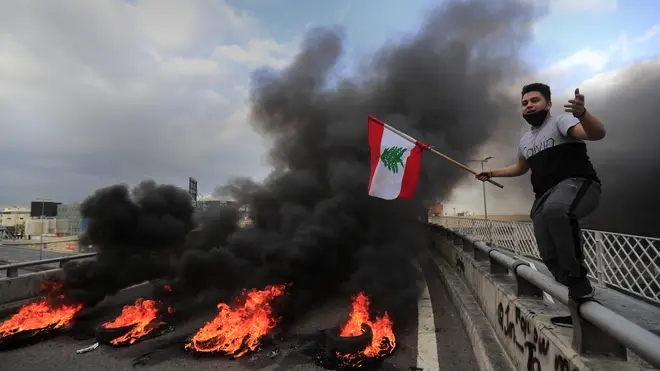
Vanessa Feltz 3pm - 6pm
8 March 2021, 09:24

Lebanon’s caretaker prime minister Hassan Diab has warned that the country was quickly heading towards chaos.
Protesters closed all major roads leading to the Lebanese capital on Monday, causing traffic jams and triggering a warning by the head of the hospitals union, who said such moves are preventing oxygen supplies from reaching medical centres treating coronavirus patients.
The protests come against the backdrop of a crash in the local currency, an increase in the prices of consumer goods and political bickering between rival groups that has delayed the formation of a new government.
From early morning, small groups of demonstrators blocked the southern, northern and eastern entrances to Beirut with burning tyres and by parking vehicles on the main roads.
In other parts of Lebanon, army soldiers briefly opened some roads only to have protesters close them again shortly afterwards.

Sleiman Haroun, president of the Syndicate of Hospitals in Lebanon, told The Associated Press that after a two-day weekend when there is no oxygen distribution, some hospitals are running low and urgently need supplies, especially to treat Covid-19 patients.
“This is not a joke. It is a matter of life and death,” Mr Haroun said, urging protesters to allow vehicles carrying supplies of oxygen to pass.
There are several oxygen plants around Lebanon and they supply hospitals throughout the country, including some in remote areas.
Despite a weeks-long lockdown in Lebanon, cases of coronavirus remain high in the tiny country, with 2,377 new cases registered on Sunday, raising the total cases since February last year to more than 395,000.

The virus has also killed 5,047 people, including 33 on Sunday.
On Saturday, Lebanon’s caretaker prime minister Hassan Diab warned that the country was quickly heading towards chaos and appealed to politicians to put aside their differences in order to form a new government that can attract desperately needed foreign assistance.
Lebanon has been hit by one crisis after another, starting with nationwide protests in October 2019 that revealed a severe financial and economic crisis.
The situation was made worse by coronavirus and a massive blast at Beirut’s port in August that killed 211, wounded more than 6,000 and damaged large parts of Beirut.